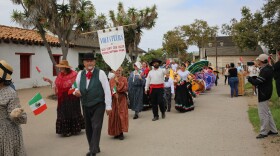The first time I saw the truck with the grisly billboard-sized pictures of so-called "aborted fetuses," I was in Hillcrest with some friends. It was several years ago, shortly after moving to San Diego. The pictures were grotesque and obviously meant to provoke a reaction. I had never seen anything like it before and my initial reaction was "Who's driving?" If that sounds odd, it's only because as a journalist, I've always been fascinated with extremist groups and extremists themselves. So when the issue of abortion resurfaced on the national level after the Supreme Court upheld a ban on "partial-birth abortion," I thought it was time to meet the guy who drove the truck.
When I pitched the story to Full Focus' executive producer, Natalie Walsh, I was unfocused, had done little research and was fairly uncommitted. She liked the idea of tackling a subject we don't hear much about on the news. She said, "Yes, pursue the story," and sent me off to do some research.
What happened next surprised me most as a journalist. When I talked to friends, neighbors and colleagues, they questioned my motive for telling this story. Why would I wade into this debate? Did I have my own agenda? It made me feel defensive. Some asked why I would give airtime to "those people." One freelance photographer told me he didn't want any part of this story.
A week after my first meeting with Natalie, I told her I wanted out of the abortion story. "I don't want to do this. People are getting mad at me," I said. It's emotional, volatile, and divisive. A story with no resolution or satisfying conclusion. "Maybe that's why we should do this," she said. "Because no one else will."
For the next several weeks, photojournalist Erica Simpson and I immersed ourselves in the abortion debate. We never met the truck driver, but did meet a woman who regularly protests outside an abortion clinic. She chases people and cars, shouting her anti-abortion message. She displays giant cardboard pictures of what she says are aborted fetuses. I confess, I was uncomfortable and embarrassed. I wondered if the people driving by knew I was a reporter, or did they think I was another protester. There seemed to be no comfortable distance between me as journalist and the subject I was covering.
Later, we sat down and interviewed her. This same woman, who shouted so desperately, looked so fierce, and seemed so rabid in front of that abortion clinic, turned out to be a warm, intelligent and kind woman who truly believed she was doing the right thing.
We spoke with women who had abortions and were willing to tell us their stories. Some with regret, others grateful they had the option. And I wondered, as I often do, why people are willing to share their most personal stories in such a public way. In the end, I believe they want to help others by sharing their own experiences. Their trust in me to be true to their intent is both daunting and humbling.
Many journalists subscribe to "objectivity." But I find myself wondering whether true objectivity is even possible. As people, we all have a point of view. As a woman, a mother, a Canadian who grew up in a poor working class neighborhood, and a journalist who believes in public broadcasting, I view the world through my experiences. A truly "objective" report is merely a transcript with no insight, no perspective, and without critical thinking. But even though an honest report can allow personal insight into a story, it must stop short of skewing it with opinion and judgment.
The stories we choose to cover and not cover are more revealing of our biases -- the people we interview or choose not to interview, the questions we ask and don't ask. And to remain unbiased, we can't shy away from issues or people that may offend or disagree with us. After all, the most we can hope for as journalists is balance and fairness in our attempt to report the truth.
As a postscript, I watched the first story in our series, Choice and Regret , at a friend's house with a small group of women and a bottle of wine. I watched my friends react. They got mad, cursed at the TV, and recounted their own personal stories. For the next few hours, we talked about abortion, sex, pregnancy and motherhood. For an issue so divisive, so emotional and unclear, that may be all I can hope for -- that the story inspired an informed conversation, aware of two sides, holding some glimmer of understanding into an issue that is so often muffled by stigma and trepidation.
-- Joanne Faryon is a reporter for KPBS News and Full Focus . Please read our guidelines before posting comments.





